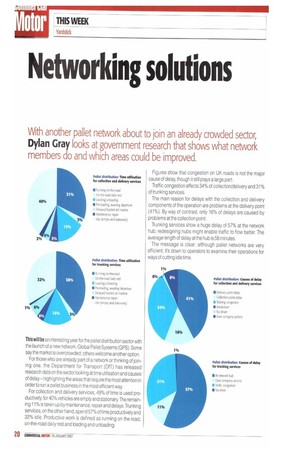Networking solutions
Page 20

If you've noticed an error in this article please click here to report it so we can fix it.
With another pallet network about to join an already crowded sector, Dylan Gray looks at government research that shows what network members do and which areas could be improved.
This will be an interesting year for the pallet distribution sector with the launch of a new network, Global Pallet Systems (GPS). Some say the market is overcrowded; others welcome another option.
For those who are already part of a network or thinking of joining one, the Department for Transport (DfT) has released research data on the sector looking at time utilisation and causes of delay— highlighting the areas that require the most attention in order to run a pallet business in the most efficient way.
For collection and delivery services, 49% of time is used productively; for 40% vehicles are empty and stationary. The remaining 11% is taken up by maintenance, repair and delays. Trunking services, on the other hand, spend 57% of time productively and 32% idle. Productive work is defined as running on the road, on-the-road daily rest and loading and unloading. Figures show that congestion on UK roads is not the major cause of delay, though it still plays a large part.
Traffic congestion affects 34% of collection/delivery and 31% of trunking services.
The main reason for delays with the collection and delivery components of the operation are problems at the delivery point (41%). By way of contrast, only 16% of delays are caused by problems at the collection point.
Trunking services show a huge delay of 57% at the network hub; redesigning hubs might enable traffic to flow better. The average length of delay at the hub is 58 minutes.
The message is clear: although pallet networks are very efficient, it's down to operators to examine their operations for ways of cutting idle time.






















































































































































































